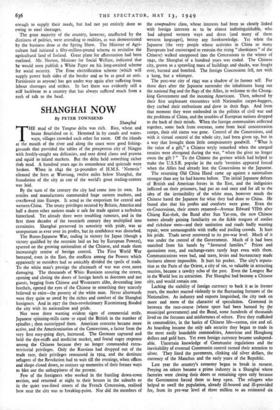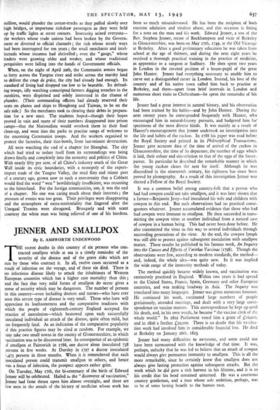SHANGHAI NOW
By PETER TOWNSEND Shanghai HE mud of the Yangtse delta was rich. Rice, wheat and beans flourished on it. Hemmed in by canals and water- ways, villages crowded each other for room. Off the islands at the mouth of the river and along the coast were good fishing- grounds that provided the tables of the prosperous city of Ningpo with freshly-caught sea delicacies, and sent dried clams and prawns and squid to inland markets. But the delta held something richer thin mud. A hundred years ago its somnolence and quietude were broken_ When in 1842 the 32-pounders of H.M.S. 'Nemesis' silenced the forts at Woosung, twelve miles below Shanghai, the foundation of the city as one of the world's great trading-centres was laid.
By the turn of the century the city had come into its own. Its textiles and manufactures commanded huge eastern markets, and overflowed into Europe. It acted as the emporium for central and western China. The treaty privileges secured by Britain, America and half a dozen other nations made it safe for trade against a turbulent hinterland. Yet already there were troubling rumours, and in the first three decades of the twentieth century they multiplied into certainties. Shanghai preserved its notoriety with pride, was as unrepentant as ever over its profits, but its confidence was disturbed.
The Russo-Japanese War, ending in victory for Japan (though a victory qualified by the restraint laid on her by European Powers), spurred on the growing nationalism of the Chinese, and made them increasingly restive of foreign control. The First World War betrayed, even in the East, the conflicts among the Powers which apparently to outsiders had so amicably divided the spoils of trade. To the white man's prestige the aftermath of war was even more damaging. The thousands of White Russians scouring the streets, opening and closing the doors of foreign hotels as doormen and not guests, begging from Chinese and Westerners alike, descending into brothels, opened the eyes of the Chinese to something they scarcely believed to exist—the poverty of the white man. Never afterwards were they quite so awed by the riches and comfort of the Shanghai foreigners. And in 1927 the then-revolutionary Kuomintang flooded the city with its nationalism and pride.
Nor were there wanting evident signs of commercial strife. Japanese spinning-mills came to equal the British in the number of spindles ; then outstripped them. American concerns became more active, and the Americanisation of the Concessions, a factor from the -very first easy-going days, increased. The Germans captured and held the dye-stuffs and medicine market, and found eager response among the Chinese because they no longer commanded extra- territorial privileges. Only the Russians had dropped out of the trade race, their privileges renounced in 1924, and the destitute refugees of the Revolution had to wait till the evenings, when offices and shops closed down, to conjure up memories of their former ways to blot out the unhappiness of the present.
Few of the foreigners who worked in the bustling down-town section, and returned at night to their houses in the suburbs or in the quiet tree-lined streets of the French Concession, realised bow near the city was to breaking-point. Nor did the members of the compradore class, whose interests had been so closely linked with foreign interests as to be almost indistinguishable, who had adopted western ways and dress (and many of them western languages), betray any foreknowledge. Yet when the Japanese (the very people whose activities in China so many Europeans had encouraged to restrain the rising " cheekiness " of the Chinese) walked unopposed into the Concessions in the winter of 1941, the Shanghai of a hundred years was ended. The Chinese city, grown to a sprawling mass of buildings and shacks, was fought over, burned and bombed. The foreign Concessions fell, not with a bang, but a whimper.
The post-war city of 1945 was a shadow of its former self. For three days after the Japanese surrender the inhabitants hung out the national flag and the flags of the Allies, in welcome to the Chung- king Government and the incoming Americans. Then, sobered by their first unpleasant encounters with Nationalist carpet-baggers, they curbed their enthusiasm and drew in their flags. And from that moment they were embroiled in the politics of civil war and the problems of China, and the troubles of European nations dropped to the back of their minds. When the foreign communities collected together, some back from overseas, some from local concentration camps, their old status was gone. Control of the Concessions, and with it virtual control of the whole city, had been given up, but in a way that brought them little compensatory goodwill. "What is the value of a gift," a Chinese wryly remarked when the unequal treaties were abrogated during the war, "when the giver no longer owns the gift ? " To the Chinese the gesture which had helped to make the U.S.S.R. popular in the early 'twenties appeared forced when the Allies had already lost the Concessions to the Japanese.
The returning Old China Hand came up against a nationalism stronger than any he had known before. The initial Japanese defeats of British and American forces in the East, and the indignities inflicted on their prisoners, had put an end once and for all to the idea of the invincibility of the white man, however much the Chinese hated the Japanese for what they had done to China. He found also that his profits and comforts were gone. Even the ex-Concessions, their streets renamed—Avenue Edward VIIth after Chiang Kai-shek, the Bund after Sun Yat-sen, the new Chinese names already gaining familiarity on the fickle tongues of coolies and rickshaw men—and their sanitation and roads badly wanting repair, were unmanageable with traffic and jostling crowds. It hurt his pride. Trade never recovered to its pre-war level. Much of it was under the control of the Government. Much of it had been snatched from his hands by "favoured families." Prices and quotations rose, and exchange-rates rarely kept even with them. Communications were bad, and taxes, levies and bureaucracy made business almost impossible. It hurt his pocket. The city's reputa- tion as the Paris of the Orient, a city of sin, so valuable in attracting tourists, became a tawdry echo of the past. Even the Longest Bar in the World lost its attraction. For Shanghai had become a Chinese city, and would remain one.
Lacking the stability of foreign currency to back it as in former years, the market reacted violently to the fluctuating fortunes of the Nationalists. As industry and exports languished, the city took on more and more of the character of speculation. Crammed in between the race-course (whose sport had been banned by the municipal government) and the Bund, some hundreds of thousands lived on the fortunes and misfortunes of others. First they trafficked in commodities, in the basics of Chinese life—cotton, rice and oil. As hoarding became the only safe security they began to trade in the most easily hoardable commodities, American and Hongkong dollars and gold bars. Yet even foreign currency became undepend- able. Uncertain knowledge of Communist regulations and the inevitability of eventual Communist control turned their attention to silver. They lined the pavements, clinking old silver dollars, the currency of the Manchus and the early years of the Republic.
Last year the country's economy began to break in earnest. Preying on others became a prime industry in a Shanghai where factories were closing their doors or remaining open only because the Government forced them to keep open. The refugees who helped to swell the population, already ill-housed and ill-provided for, from its pre-war level of three million to an estimated six million, would plunder the cotton-trucks as they pulled slowly over high bridges, or importune rickshaw passengers as they were held up by traffic lights at street corners. Insecurity seized everyone— the workers whose trade unions had been broken by the Govern- ment or diverted to official channels ; the rich whose steady ways had been interrupted for ten years ; the small merchants and intel- lectuals whose incomes had shrivelled ; even the "gangs," whose leaders were growing older and weaker, and whose traditional perquisites were falling into the .hands of Government officials.
When, on the night of April zoth, the Communist armies began to ferry across the Yangtse river and strike across the marshy land to deliver the coup de grace, the city had already had enough. Its standard of living had dropped too low to be bearable. Its defend- ing troops, idly watching conscripted farmers digging trenches in the outskirts, were dispirited and solely interested in the chance of plunder. (Their commanding officers had already reserved their seats on planes and ships to Hongkong and Taiwan, to be on the safe side.) So the merchants took to clearing their debts in prepara- tion for a new start. The students hoped—though their hopes proved in vain and many of their numbers disappeared into prison camps—that the Nationalists would overlook them in their final clean-up, and went into the parks to practise songs of welcome to the oncoming Communist troops. And the workers organised to protect the factories, their rice-bowls, from last-minute destruction.
All were watching the end of a chapter for Shanghai. The city which had tried to isolate itself from its surroundings was being drawn finally and completely into the economy and politics of China. With nearly fifty per cent. of all China's industry south of the Great Wall inside its civic boundaries, with a monopoly of the export- import trade of the Yangtse Valley, the mud flats and minor port of a century ago, grown now to such a monstrosity that a Cobbett would find the word " wen " bewilderingly insufficient, was returning to the hinterland. For the foreign communities, too, it was the end of a chapter. No one was caring much about their interests ; the pressure of events was too great. Their privileges were disappearing and the atmosphere of extra-territoriality that lingered after the Unequal Treaties were abrogated. Brusquely and with scant courtesy the white man was being relieved of one of his burdens.







































 Previous page
Previous page